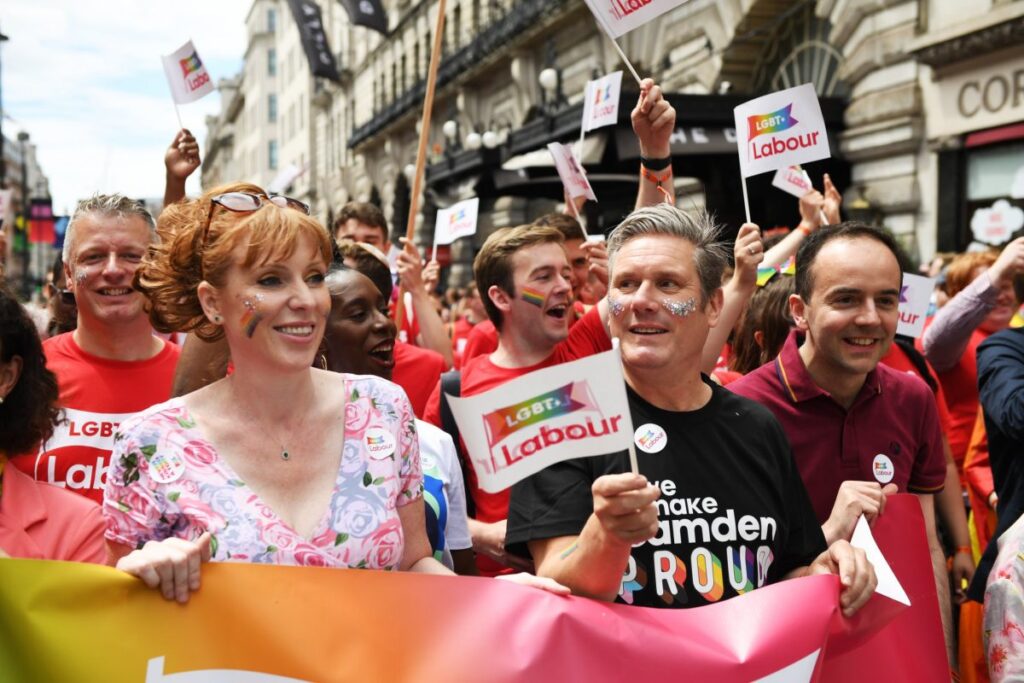Even Labour’s most ardent critics might have once acknowledged it as the party for minorities and equal rights. It was Labour, after all, that enshrined these principles in the Equality Act 2010, marking one of the final legislative acts of the Blair-Brown era. The party’s legacy includes significant milestones such as the introduction of the London Partnership Register by then-Mayor Ken Livingstone in 2001, the repeal of Section 28, the equalization of the age of consent, and the passage of the Gender Recognition Act. Despite the Conservative-Liberal Democrat coalition introducing same-sex marriage, it was a majority of Labour MPs who ensured its passage.
When Labour won the general election last year, there was a palpable sense of relief and hope among LGBT communities. Relief that 14 years of Conservative rule, which began with same-sex marriage but ended with increasing transphobia, was over. There was hope that Keir Starmer, with his background as a human rights lawyer and supporter of LGBT rights, would protect these communities. Yet, a year into Starmer’s leadership, many feel a sense of disappointment and betrayal.
Starmer’s Promises and the Reality
Before the general election, Starmer promised a “reset” for LGBT people, pledging to end the community’s use as a “political football,” introduce a “trans-inclusive ban on conversion practices,” and strengthen laws to ensure LGBT+ hate crimes attract tougher sentences. However, progress has been limited. Under the Crime and Policing Bill, hate crimes against LGBT individuals are now treated with the same severity as racist hate crimes, allowing for harsher sentences. Additionally, funding has been increased for LGBT domestic abuse victims and a compensation fund for veterans dismissed due to their sexuality. Yet, only 69 out of 1,200 applicants have received compensation.
The promised ban on conversion therapy remains unfulfilled. Despite evidence of its harm and the existence of blueprints to outlaw it, progress has stalled. The equalities minister, Bridget Phillipson, reiterated Labour’s commitment to a trans-inclusive ban in May, but skepticism remains about its realization within the first term.
Escalating Concerns for Transgender Rights
For many transgender individuals, the past year has been particularly challenging. The government indefinitely banned puberty blockers for trans youth, and waiting lists for gender clinics have increased, despite recent improvements. The process to simplify gender recognition was quietly abandoned, reportedly due to concerns about the rise of Reform UK.
Last year, the government extended Baroness Falkner’s term as chair of the Equality and Human Rights Commission (EHRC), a decision criticized by trans advocacy groups. Under her leadership, the EHRC released guidance following a Supreme Court ruling that defined “woman” based on biology, not gender identity. This guidance restricts trans individuals from using bathrooms aligning with their gender identity, raising privacy concerns.
“We don’t think Article 8 rights apply,” Baroness Falkner stated, referring to the Human Rights Act’s right to a private and family life.
Leadership and Future Directions
The government’s choice for Falkner’s successor, Dr. Mary-Ann Stephenson, has also raised eyebrows. Known for supporting gender-critical viewpoints, her appointment has not alleviated concerns about the EHRC’s direction. Following the Supreme Court ruling, the government could have clarified its limitations, emphasizing that it applies to the Equality Act and not as a legal definition of gender identity. Instead, Starmer accepted the ruling, a stark contrast to his earlier stance that “trans women are women.”
When asked about Starmer’s achievements for LGBT rights, a government spokesperson highlighted his participation in an on-camera HIV test and efforts to facilitate IVF treatment for same-sex female couples. However, the promised conversion therapy ban remains elusive.
International Attention and Broader Implications
This perceived regression in LGBT rights has drawn international attention. The Lemkin Institute for Genocide Prevention recently issued a “red flag alert for genocide” concerning developments in the UK, citing efforts to harm transgender and intersex individuals by stripping privacy and segregating them.
Victoria McLoud, a former judge, described the situation as “steps tending towards cultural genocide,” highlighting issues such as bathroom bans, violence, and social exclusion.
The use of “genocide” may seem extreme, but it aligns with the concept of “cultural genocide,” coined by Raphael Lemkin in 1944, referring to the destruction of a culture rather than a people. The Lemkin Institute views recent actions as part of a broader erasure process.
As Labour navigates these complex issues, the party faces increasing pressure to fulfill its promises and address the concerns of the LGBT community. The coming years will be crucial in determining whether Labour can reclaim its legacy as a champion of equal rights.
 Reform UK Surges in Polls as Starmer’s Approval Hits Record Low
Reform UK Surges in Polls as Starmer’s Approval Hits Record Low Portsmouth Eyes Transfer as Brescia Faces Bankruptcy Crisis
Portsmouth Eyes Transfer as Brescia Faces Bankruptcy Crisis Southsea Venue Vandalized: Police Seek Suspect in Window-Smashing Incident
Southsea Venue Vandalized: Police Seek Suspect in Window-Smashing Incident South-East Leaders’ Loyalty to Tinubu Transcends Party Lines, Says Minister Umahi
South-East Leaders’ Loyalty to Tinubu Transcends Party Lines, Says Minister Umahi Starmer Defends Reeves Amid Emotional Commons Moment and Market Jitters
Starmer Defends Reeves Amid Emotional Commons Moment and Market Jitters